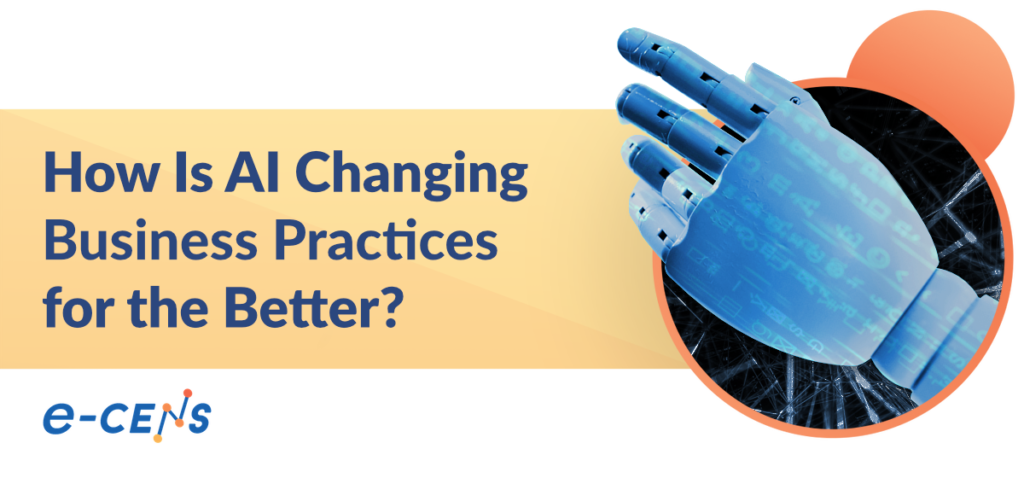The use of Artificial Intelligence (AI), especially in the form of Machine Learning (ML), is well and truly established in many industries. And, thanks to the release of Chat GPT and Bard, the potentiality of how AI can assist us in the workplace is becoming clearer.
Briefly, before we continue, let’s take a moment to lament that there is no simple definition of AI or a simple distinction between AI and ML. It very much depends on who you ask. For our purposes, we use AI when the technology is attempting to imitate or relieve the workload of a person. Machine Learning, is held for scenarios where large volumes of data are processed to allow trends and rules to be extracted.
There are some incredible companies out there that are revolutionizing industry performance by front-running the application of ML. Consider those well-designed online retail stores whose search functions cope with spelling errors and synonyms, for example. They have been applying language models long before most people knew they existed.
ML technology is the most commonly applied form of AI. It is utilized in myriad ways across various fields. Modern Machine Learning can help improve operations and produce clear, helpful results when applied correctly.
Some businesses, however, simply have not put ML or AI into use yet, which is why early adoption becomes such an interesting and challenging barrier. Is your business ready? It very likely is, and there is no better place to start than with business analytics.

Machine Learning in Business Analytics
Machine Learning can be applied to numerous aspects of a business, with marketing being one of the go-to areas. With ML technology, companies can now easily quantify and analyze enormous amounts of data at rapid speeds, giving them real-time analysis of essential information. This, in turn, helps the companies create data-driven decisions and timely strategies that improve business efficiency and outcomes.
Our previous article “4 Common Mobile Analytics Pitfalls To Avoid” explains that today’s technology enables companies to track important factors such as user and client engagement and retention. This allows businesses to understand how customers use their Apps and optimize their design. The same goes for marketing strategies. Integrating ML technology into such data analytics helps automate finding different areas for improvement and strengths to build on.
We anticipate that in the not-so-distant future ML will truly be a co-pilot assisting marketing teams with collecting, storing, transforming, and activating first-party data.

Machine Learning in Cybersecurity
ML also has a role to play in security. This is particularly relevant with the shift to remote work. The threat landscape is much wider, and hackers have been exploiting system vulnerabilities and causing dangerous data breaches. This results in the theft of sensitive company information and customer PII data, and compromises client- and partner-related data. The damage that such breaches can cause brands is astronomical.
Injecting ML technology into a business’s security system offers the potential to detect weaknesses and potential threats and alert companies before there is any cause for concern. As Maryville University’s write-up on cybersecurity roles highlights, embracing robust safety measures is a necessity for organizations while attack frequency grows. Having a skilled information security manager — knowledgeable of cyber trends with the right analytical skills – supported by ML helps boost protection. The ML system can quickly identify problems (or potential problems) while its human counterparts work out remedies.
Operations assistance
ML technology can also be used to help streamline tasks and make operations more fluid. CNBC explains that these innovations have helped increase efficiency in many industries during the pandemic –– such as healthcare, for example. The systems can procure and deliver data, act as “smart” chat machines to answer FAQs, and track necessary information.
While you are still far more likely to be interacting with a person when you reach out to customer services than with an “intelligent” program, adoption is growing.
AI as a PA?
It seems likely that people will begin to encounter AI in their office where it functions as a personal assistant (PA) – providing reminders and notifications and identifying how operational improvements can be made.
We can anticipate a future where AI can contribute to automated processes where a person’s input isn’t needed, such as outreach management and basic customer inquiries. Such applications not only increase efficiency and productivity but also reduce redundancy and spare employees from mundane or repetitive tasks.
Conclusion
ML and AI systems already provide practical solutions to various problems while also helping to build up future-proof company practices. As innovation and development continue, there is no doubt that we will continue to discover newer and better ways to apply the technology to business practices.
Next time you have a delivery arrive at your home, consider this: did the driver navigate to your door by selecting the optimal path from the available roads, or was their route mapped by an algorithm? Machine Learning algorithms are already improving your day-to-day experience, and their impact will only grow. The big question is, when are you going to invite ML or AI into your business?








